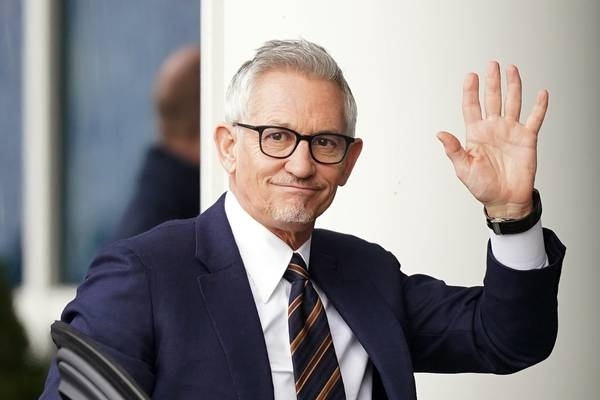BBC management ‘weakened’ as deal struck to put Gary Lineker back on air

The BBC defused a crisis over its sports coverage on Monday after it agreed to put presenter Gary Lineker back on air, but insiders at the broadcaster said the row over impartiality had weakened senior management. Lineker, who presents the Match of the Day football show, was suspended by the BBC on Friday after it concluded he had breached its impartiality rules when he tweeted criticism of the government’s immigration policy. Much of the BBC’s sports coverage was badly disrupted over the weekend after pundits and commentators refused to work in an expression of solidarity with Lineker. To resolve the impasse, the BBC said on Monday it would review its social media guidance for journalists and presenters, with Lineker agreeing in the meantime to follow existing rules ahead of returning to Match of the Day this weekend. Allies of BBC director general Tim Davie said Lineker’s return with a commitment to abide by the rules was a good outcome, but senior executives claimed Davie had been weakened, with one saying he was “bruised” by the episode. Labour had claimed the BBC bowed to pressure from the government to suspend Lineker, although Mr Davie said this was not the case. BBC director general Tim Davie has confirmed that Gary Lineker will return to his usual Match of the Day presenting duties next Saturday. Mr Davie made a renewed focus on political impartiality for BBC staff a priority after being appointed director general in 2020, and oversaw the introduction of social media guidance. One senior BBC executive said: “One thing I’ll say for Tim is, yes, he screwed this all up. But he did realise it very fast and worked out he had to retreat rapidly.” Steven Barnett, communications professor at Westminster university, said: “It clearly is a climbdown, and badly needed.” [ Gary Lineker is politically juvenile, but the BBC is utterly naive ] Lineker said on Twitter he would “like to thank Tim Davie for his understanding during this difficult period. He has an almost impossible job keeping everybody happy, particularly in the area of impartiality”. Mr Davie apologised to audiences for the “difficult period” and said he “recognised” the “potential confusion caused by the grey areas of the BBC’s social media guidance”. He said the review of the guidance, to be led by an independent figure, would have “a particular focus on how it applies to freelancers outside news and current affairs”. Lineker has previously expressed the view that, as a freelance sports presenter, he was not covered by the strictest sections of the BBC impartiality rules. [ Gary Lineker suspension: Who is Tim Davie, BBC director general and ex-Conservative party official? ] While most BBC presenters outside the news divisions are not bound by the tight restrictions that apply to journalists, Lineker was deemed to be an exception: its rule book states that some contributors have “an additional responsibility to the BBC because of their profile”. BBC insiders said Lineker, who was paid £1.35 million in 2021-22, is one of just a handful of presenters caught by this rule. One cited Claudia Winkleman and Graham Norton, who present BBC radio and TV light entertainment shows, as among the few others. Richard Sambrook, a former director of BBC news who has been involved in reviewing parts of the BBC’s impartiality rules, said it would be “reasonable” to relax the guidance for Lineker and accept that expert outsiders like him are “essentially external contributors rather than de facto BBC figures”. But senior BBC figures have previously expressed reservations about such a move, with one involved in the Lineker saga saying: “If we give free rein [to people outside news divisions] ... we’ll just have more rows.” [ Ken Early: In politics and football punditry, impartiality is yesterday’s news ] The Lineker saga has served to increase the focus on BBC chairman Richard Sharp, a Conservative donor who has been under pressure following claims he helped Boris Johnson secure a guarantee on a loan shortly before the then prime minister recommended his appointment at the broadcaster. Labour said the Lineker controversy showed up “how senior BBC decision-making is so susceptible to political influence” by the government. The opposition party said Mr Sharp’s position was “increasingly untenable” as his political ties to the Tories made him unable to be an even-handed chairman. The Whitehall appointments watchdog is investigating how Mr Sharp became BBC chair. He has denied wrongdoing. Rishi Sunak, who once worked for Sharp at Goldman Sachs, distanced himself from his former boss. He told the BBC during a visit to California: “He was appointed before I was prime minister through an independent process.” – Copyright The Financial Times Limited 2023
Fintan O’Toole: The sane way to deal with a tweet like Gary Lineker’s
Former BBC director-general: Reinstatement is ‘like a 5-0 win’ for Gary Lineker
:quality(70):focal(1679x332:1689x342)/cloudfront-eu-central-1.images.arcpublishing.com/irishtimes/BKSLPH5VJDB6HAD4MSZSGZ5CVA.jpg)
BBC management ‘weakened’ as deal struck to put Gary Lineker back on air
:quality(70):focal(1407x726:1417x736)/cloudfront-eu-central-1.images.arcpublishing.com/irishtimes/E4S6RAUA5UHEKQEGX4GVEH572E.jpg)
Lineker affair exposes BBC’s curious relationship with Conservative power
:quality(70)/cloudfront-eu-central-1.images.arcpublishing.com/irishtimes/R4S6XZDPTWERFHHM3AITXDRHSA.jpg)



